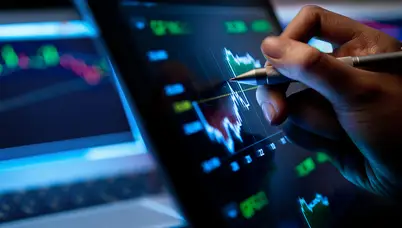Truth About Mutual Fund Performance: Process or Return?
Posted On Sunday, Jan 01, 1950
There is another true story you must know about this ant.
It used to be a roaring tiger; a leader of the pack; a swashbuckling swordsman.
And, possibly, an ignorant idiot.
It still is brave - and willing to fight for a cause.
It is still willing to lead.
And it is still willing to take risks.
We fought against the dance of the elephants; we have fought against P-Notes and short-term speculative money which we believe distorts the Indian stock markets and scares the retail investors; and we have fought against the undercover bail-out of the real estate companies.
We don't "fight" fight. At 63 kilos, and no muscle, I wouldn't stand a chance in any fight. We don't carry swords and guns - we fight with the power of our integrity.
We try to speak the truth - and try to live this truth.
We may be an ant - but we are brave and we lead.
The idiot of the mutual fund industry?
But, a few of you have asked, why are your returns so "poor"?
Are we idiots?
We give you all this bhashan, which is good for the soul but, boss, where is my return?
This is a comment from Allan Govias:
At the end of the day the returns performance of the scheme matters the most. (keeping risk parameters in mind, though). Your long term equity fund ranks 60/217 in the 6 months category, 32/ 208 in the one year category and 106/ 158 in the three year category (as per Valueresearch). Not a very impressive track record you will admit especially as the total collections of your schemes are modest.
While your "honest thruths" make interesting reading "your holier than thou" flavour jarrs.
Best wishes,
There is nothing wrong in what Mr. Govias has written.
And I have selected this statement because it is most representative of reactions that I get when I tell people who we are - and what our "track record" is.
Mr. Govias, sir, I use your name because you have posted it as a comment.
But the concerns you voice are common, hence, this is a perfect illustration of the challenges we face - and the things that investors must worry about when they decide where to invest.
And how to invest.
At the outset, I wish to confirm that every single word Mr. Govias is a fact.
And every thing he has said is true.
But every thing he has said is not applicable to the way we manage the capital you invest with us.
We are not the smartest folks in the fund management industry, but we are not the idiots of the fund management industry.
Return or process?
Let me start with the first sentence:
Comment: At the end of the day the returns performance of the scheme matters the most
I beg to disagree.
Most investors follow the ranking tables which are backward looking data points. These rankings tell you nothing about the future.
When deciding which mutual fund to invest in, I believe that investors need to understand the underlying characteristic of a fund, not its return performance in isolation.
This is not a race - where you need to invest in the fund ranked number 1, 2, or 3.
You have given your savings to someone you don't know.
And are probably never likely to meet.
To invest in stock markets that you know very little about.
Yes, you want Prince Charming - ranked number one in the league tables for looks, charm, and wealth - to land up and marry your daughter.
But what does Prince Charming do when the lights are out?
When no one is looking?
When he thinks he can get away with it without being caught?
We nudge our children to marry a spouse because of their character and their behaviour - not for their rankings in the league tables.
You need to quiz Prince Charming - drill him a bit.
And drill the fund managers - after all, you are giving them your savings, your money that one day will help buy the house in which you have the wedding party; or the money that is being used to educate your children.
The important questions to be asked are:
Why did the fund manager buy a specific stock?
Or not buy a specific stock?
Or buy so much of it?
Or so little of it?
How do these decisions get made?
Who makes them?
What happens if that main person making decisions leaves?
At the end of the day, the character and the sustainability of the research and investment process matters the most. Not the returns.
If you know the process, you will know the expected performance.
Prince Charming could end up being the biggest rogue that ever lived.
And you don't want to give your daughter's hand in marriage to him.
Measuring risk
The next comment is: (keeping risk parameters in mind, though)
I could not agree more.
Every return has a risk associated with it.
In the field of investments, there is nothing like a continuous free lunch.
Or a continuous sure shot bet.
At the end of the day the returns performance of the scheme matters the most. (keeping risk parameters in mind, though).
The man with the black overcoat calls you on a dark, moonless night: "Pssst, come here and take this hundred rupee note. All I need from you is a fifty rupee note".
You hesitate.
What if it is a fake note?
But, eventually, greed gets to you.
You step in and give him a "fifty"; he gives you a "hundred".
Nervous, you head to the bank the next day and change the note.
No alarm bells ring. The teller smiles, and gives you the notes of smaller denomination.
The next night, the man in black overcoat is there again, but this time he has five notes of hundred rupees to give you. You are prepared - you brought ten notes with you. You head back to the bank - smiling confidently.
The teller smiles back. No alarms. Just more cash.
You are on top of the league tables.
You have the best return on investment.
The third night, you go out looking for the man in the black overcoat.
You have a suitcase full of fifty rupee bills.
The man in the black overcoat shows up - with a suitcase.
The next day you head off to the bank.
By 7 pm you are featured on "Breaking News" as the man found with forged notes.
You are no longer ranked high up in the league tables.
Your bet did not make it this time.
There is no measure of risk used in any mutual fund ranking table which you have access to that captured the propensity of your fund manager to take risks.
Risk measurements are backward-looking, statistical tools that tell you absolutely nothing.
Every risk model failed to predict the chain of events of a sub-prime mortgage crisis in USA.
And finance companies had spent hundreds of millions of dollars in building risk models.
We are not damning any company by not buying it - we have missed many companies that we judged wrong.
And there are many companies that we did buy, which I wish we had never bought!
We assess risks - and then we try to "price" it.
The man in the black coat is a risk - we price his risk by staying away from him.
Our exposure to him is zero.
When he delivers the first few trades and the people doing the trade with him make money, we look stupid in any ranking table.
But that is fine with us.
Yes, Mr. Govias, once you know the risks that have been taken, then you can compare the returns.
But risk is a really strange thing.
It is a silent statistic till it blows up.
And like a Satyam: it could take years to blow up.
And once it blows up, you pay a heavy price for owning it.
Like an Enron, a WorldCom, a Yukos, a Lehman, a Bear Stearns, a Citibank, a Goldman - all very well respected companies which blew up pretty quickly.
Find out how many such risks are there in the portfolios of the fund manager that you invest in.
I write this to start the dialogue on the kind of risks we will - or will not - take.
For years the mutual fund industry has been hijacked by matters irrelevant to investors.
What matters to an investor is not the number of neon lights that any mutual fund house can buy or the amount of distributors who push the product for some hidden fees. No, these were the honey-traps for your innocence. For your blind trust.
What matters is how we manage your investments; your pool of savings.
And the risks we take with your money.
There is one golden rule that we adhere to at Quantum Mutual Fund: If you have shaken hands with someone, and got only four fingers back - try to avoid the next handshake.
Gauging who to shake hands with - and whom not to shake hands with - is part of our research and investment process.
I am happy to stay out of any league table.
But I want that the investor's hard-earned money should not take any undue risks.
Risk is a subjective matter - but it is a principle that we have at Quantum Mutual Fund and try to improve on it from mistakes we make.
Our track record is not "not impressive".
Comment: Your long term equity fund ranks 60/217 in the 6 months category, 32/ 208 in the one year category and 106/ 158 in the three year category (as per Valueresearch). Not a very impressive track record you will admit
6-months | 1-year | 3-year | |
Quantum Long Term Equity Fund | 60 | 32 | 106 |
Total Funds | 217 | 208 | 158 |
We did better than these fund | 157 | 176 | 52 |
What % of funds did we do better than? | 72% | 8% | 33% (this is the "ouch!") |
No excuses.
Not a great track record for the 3-year number, though the near-term numbers are very good.
I am not sure what specific dates these data points cover, but I know that we have never made it to the Number One Rank.
And we know that we never will make it to the Number One Rank.
I can predict that because we have a process that will stop that from happening!
Sounds crazy?
Well, some more on rankings and how to better understand what they say - or do not say:
I spoke about the risk that we avoid - and how it hurts our performance rankings; We prefer the "sleep well" rankings;
The list of funds ranked includes many sector specific funds and they can move like rockets or sink like broken ships. These sector funds bounce around a lot. For example, sector funds and thematic funds like "infrastructure funds" or "emerging company" funds made a lot of money for investors in 2006 and 2007 and lost, and probably lost, on average, -80% in the calendar year 2008. We invest in many sectors - some do well and some don't do well over any specified time frame. A sector fund is either at the moon - or at the bottom of the ocean. If you are on a ride to the moon, you can afford to send your child to Harvard or Yale. And if you sink, it's Jai Hind College.
Most fund houses have many equity funds. Some of these are ranked high, and some are ranked low. So, when you are asked to buy the fund of a fund house with many equity fund offerings, you better be sure you know which equity fund you are buying. Your child could end up in Harvard, Yale, or in Jai Hind. By the way, I studied at Jai Hind - it's not a bad college, please don't get me wrong. If you went to Harvard or Yale, though, you would have had a chance to blow up the world twice: once as an investment banker and once as President of the United States of America. We have one equity fund. And even if we make you that kind of money, we don't recommend Harvard or Yale.
The last - and not the least
And, to add insult to injury, not only is my performance questionable.
My size is small.
Comment: especially as the total collections of your schemes are modest.
The myth of size is the most widely spread myth in the mutual fund industry. It was spread by the distributors and perpetuated by the elephants.
While I will let psychologists and sexologists discuss the myth of size in human sexual relationships, I can tell you this: every fund manager MUST know the capacity of his mandate.
If he does not, he fails the first test: he does not know the characteristic of his portfolio. He does not know the capacity of his stock to absorb money that he is throwing at it.
If I buy a stock that trades at an average, 10,000 shares a day can you guess what would happen to the share price if I bought 10 shares in that stock?
Probably nothing.
But what if I bought 100,000 shares in one day? Do you want to guess what would happen to the share price?
It would head to the moon.
Maybe the sun.
So, what would that fund manager do if you put more money in his mutual fund?
If he was silly (like I was in 1992, 1993, 1994) he would buy that stock and send its price to the moon.
And his rankings will go up - he got the higher return, remember?
And if you happened to ask for your money back and he had to sell that same share, guess what it would do to his returns to your money and to his rankings?
No rocket science, that. More like sinking ship science.
If a share trades 10,000 shares a day and you go to sell 100,000 shares the share price will collapse.
At Quantum Mutual Fund, we build a portfolio of stocks that can absorb thousands of crore of your money.
The size of the fund has NO bearing on what stocks we buy.
Because our fund is small, it does not allow us to "cheat" and buy the less liquid stocks whose price can be swung with a few trades.
We buy shares in companies that we believe have a good chance of increasing their earnings over time; where we can shake hands with the management and get our five fingers back; and where we know we can invest large amounts of money.
It is these principles of investing that make us dumb.
And the dumb never get ranked in any league table - well, not at the top, anyways.
The tortoise was dumb and kept plodding along.
The hare was smart - and took a break.
The tortoise won the race.
But we have no race to win.
We have risk to worry about - and return is our by-product.
"The Honest Truth makes interesting reading" - I am grateful for that compliment.
But the "holier than thou" flavour does not jar, sir - it is totally in synch with what is written and expressed in the Honest Truth.
If you wish to double your money in one year - or lose -80% in the next year, the Quantum Long Term Equity Fund is not for you.
But, try us out.
You probably have a few funds in your portfolio.
Invest Rs 10,000 with us - but only after you have read and understood and agree with our approach.
And after 3 years - please write to me and tell me which fund gave you the least worry and no sleepless nights.
Note what the league tables tell you, but don't let them guide you.
You may see us on the top brackets of some performance league tables, but that is not because of the risks we took. It would be because of the risks we did not take.
Because we stayed away from the men in black coats.
No, we are not the smartest - and never claimed to be.
Ants have little intelligence.
But we tend to survive.
Because you believe in us - and we believe in what we do.
Related Posts
-

Debt Monthly View for January 2025
Posted On Friday, Feb 07, 2025
Bond markets witnessed increased volatility during the last month with the 10-year Government
Read More -

Gold Monthly View for January 2025
Posted On Friday, Feb 07, 2025
In the calendar year 2024, gold demonstrated remarkable performance, yielding a return of ~ 27%.
Read More -

Equity Monthly View for February 2025
Posted On Thursday, Feb 06, 2025
Indian markets witnessed sharp sell-off in the month of January on the back of continued FII selling (USD -8.6Bn in January 25 vs USD -755Mn for CY2024).
Read More



